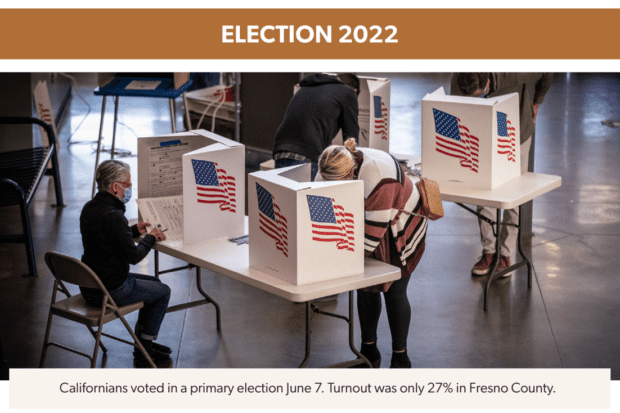

The Central Valley saw mixed results in the June 7 Primary election. Despite favorable redistricting at the federal and state level, with four Latino Voting Rights Act districts in the Central Valley, a Latino will advance in only one of those. Nevertheless, Rudy Salas could become the first Latino to represent the Central Valley in Congress.
As is often the case with primary elections, the key storyline is turnout. Or the lack thereof. The unofficial data show roughly 27% of registered Fresnans voted versus 31% of voters statewide. The key takeaways from the early returns were the low Latino turnout and the poor turnout of young voters (ages 18 to 34 years old).
In Fresno County, there were many uncontested races. Such races further the perception that the playing field is rigged and that decisions have already been made behind the scenes.
Although some point to apathy as a primary concern, it is something much more significant and systemic. If the connection between problems getting solved in your community and elected officials delivering those solutions does not exist, then voting isn’t likely to be a particularly high priority for you.
In addition, there were no particularly exciting candidates in this primary. There was no Andrew Janz or TJ Cox on the ballot. The more interesting candidates, Annalisa Perea and Jose Ramirez, were in smaller, less visible races.
Moreover, several candidates—Adam Gray, Brian Pacheco and Mike Karbassi—are divisive among Democrats as they are trying to push the party in a conservative direction contrary to its more progressive base.
From a national perspective, a collective feeling of frustration is prevalent. We cannot control inflation and high gas prices. Gun violence is widespread, but we’re not doing anything about it. Congress, particularly the U.S. Senate, seems incapable of functioning. Disinformation is rampant, and there appears to be no way to deter that.
Even the initial outrage from the leak of the forthcoming Supreme Court decision on Roe v. Wade failed to generate increased interest in this election.
And that leads us to President Biden. In some ways, Biden has gotten a bad rap. Inflation obviously is not his fault, and neither is the war in Ukraine. His agenda—mostly sound and mildly progressive—has been stymied by Senator Joe Manchin (D–W.V.) and, to a lesser extent, Senator Krysten Sinema (D–Ariz.).
But he has fallen short as a true leader. The Summit of the Americas was a disaster. He refuses to become the pied piper for gun reform in response to gun violence. He has been far too tentative on moving forward with executive orders to get something done. And he can’t get any cooperation from Manchin or Sinema; do you think LBJ would have had that problem?
Finally, all these factors combine for what could be called malaise redux. You might remember Jimmy Carter’s infamous “malaise” speech in which he says, “We can see this crisis in the growing doubt about the meaning of our own lives and in the loss of a unity of purpose for our nation.”
Even though he never used the term malaise, the idea took hold that he viewed the nation’s problems as too big for government leadership to solve, and Ronald Reagan combated said malaise by bringing John Wayne to the rescue.
We now face a similar situation, with Donald Trump, Ron DeSantis and Ted Cruz all chomping at the bit to offer make-believe solutions as a front for a malevolent oligarchy.
Congress
In District 5, incumbent Tom McClintock (R–Elk Grove) won easily and will likely do so in November as well in this Republican-leaning district. Fresno County Republican Supervisor Nathan Magsig finished a distant third; he ran an uncompetitive vanity campaign.
The District 13 seat is pretty much a lost cause. Adam Gray is the “Democrat” moving on, but he tried to paint himself as a right-wing conservative during the campaign. In the best campaign ad of the Primary, Democrat Phil Arballo’s campaign exposed Gray’s propensity for catering to his financial backers. Should Gray win, expect him to be the Joe Manchin of the House.
In Districts 20 and 21, the incumbents, Kevin McCarthy (R–Bakersfield) and Jim Costa (D–Fresno), easily advanced and appear on their way to victory in November.
The most competitive Central Valley district will again be the David Valadao (R–Hanford) District 22 seat. He is being challenged by Salas, a Bakersfield Democrat who currently serves in the State Assembly, in a seat that should trend Democratic.
For the special election to replace Devin Nunes (the old District 22), Connie Conway, a former Republican member of the State Assembly, easily dispatched newcomer Lourin Hubbard, a Fresno-based Democrat. Because of the timing of this election, the fact that the winner will serve only six months in Congress and the seat will not likely have an impact on the outcome of any vote in the House, this basically became a nuisance election.
State Legislature
For Senate Districts 12 and 14, Shannon Grove (R–Bakersfield) and Anna Caballero (D–Merced), both incumbents, should have easy paths to victory in November.
For Senate District 16, Melissa Hurtado (D–Bakersfield) will face off against David Shepard, a Republican farmer from Porterville. The Republican candidates collectively received 53% of the vote in the Primary, but the voter registration heavily favors Democrats.
Senate District 4 provided the shocker of the Primary. The district leans Republican, but it is an open seat for which six Republicans and two Democrats vied. With the Republicans splitting the vote, the Democrats were the top two vote-getters and appear slated to advance to November. This would be a red-to-blue pickup.
In Assembly District 8, Jim Patterson had no opposition.
In Assembly District 27, Democrat Esmeralda Soria had a strong showing and will face former Merced County sheriff Mark Pazin, a Republican, in November. Soria’s Fresno City Council colleague Mike Karbassi had a poor showing, finishing last overall and in Fresno County. Like Magsig, his was a vanity effort with no substantive campaign.
Joaquin Arambula appears safe in Assembly District 31.
For Assembly District 33, Jose Sigala, a Democrat on the Tulare City Council, was expected to make a strong showing against Devon Mathis (R–Tulare), but that did not happen. Sigala will have to radically reorganize his campaign to have a shot in November.
Local
No local Primary races will advance to the November ballot.
There were many uncontested countywide races with Lisa Smittcamp (District Attorney), Oscar Garcia (Auditor-Controller/Treasurer-Tax Collector), James Kus (County Clerk/Registrar of Voters) and Paul Dictos (Assessor-Recorder) all being reelected. Bob Whalen was newly elected as a Superior Court judge, and none of the judicial incumbents was challenged.
For sheriff, outgoing sheriff Margaret Mims’ handpicked successor, John Zanoni, a Republican, won. Challenger Mark Salazar, a Democrat, lost despite having the Fresno Bee’s endorsement, again reiterating how difficult it is for a Democrat to win a countywide race.
The exception, of course, is a registered Democrat who has the backing of the Republican establishment, and that was the case for Michele Copher-Cantwell in the race for superintendent of schools. Longtime educators Daren Miller and Eliseo Gamino combined got less than 40% of the vote.
For the Fresno County Board of Supervisors, Brian Pacheco was unopposed in District 1. In District 4, Jose Ramirez ran a spirited campaign, but he and fellow Democrat Daniel Parra failed to keep Republican incumbent Buddy Mendes under 50%.
Regarding the Fresno City Council races, Annalisa Perea easily surpassed 50% to win District 1 outright. She defeated Cary Catalano and two Republican candidates. Catalano previously lost to Soria in the district eight years ago. Perea will replace the termed-out Soria.
For the other districts, the incumbents, Miguel Arias, Luis Chavez and Nelson Esparza, all had convincing victories.
Looking Ahead
The November election is critical. And that is not hyperbole. If the Republicans gain control of both houses of Congress, they will likely pass a host of radical right-wing measures. We’ve seen a preview of those in Texas. Biden will sign none of them, but they’ll be waiting for a Republican president on inauguration day in 2025. At the same time, we will be subjected to continuous hearings led by such bombastic figures as Jim Jordan (R–Ohio) on every topic imaginable.
The situation is even more grim in the state houses, and even a good Democratic showing in November might not deter Republican success in state houses. Why is this problematic? Because those states are already enacting legislation that will allow them to cast their Electoral College slate for the Republican candidate for President, regardless of the popular vote in the state, and passing laws to make it more difficult to vote. Many of these states view “voter fraud” as any ballot cast for a Democrat.
How do we win in November? Turnout, turnout, turnout. We need 2018 on steroids.
Change will not take place unless we make it happen. Be the change. Si se puede.

